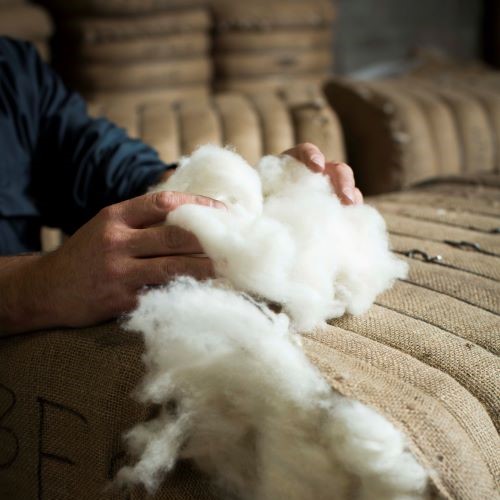It is SFA policy that only cashmere that has been dehaired and scoured in compliance with the SFA Clean Fibre Processing Standard (CFPS) can be considered to be ‘SFA Certified’. The timeline has now been defined and primary processors will have until 1st November 2024 to become certified. In order to achieve this deadline, please reach out to your supply chains and make sure they are certified, as after this date they will no longer be able to supply ‘SFA Certified’ cashmere without CFPS certification. Additionally, we will be providing training for CFPS over the next few months, so please do reach out to us at info@sustainablefibre.org if organisations within your supply chain would like to attend.
To help you communicate the benefits of certification and the process for getting certified, we have created the guide below. Please share it with your supply chain and encourage them to get certified as soon as possible.

What is the SFA Clean Fibre Processing Standard?
The SFA Clean Fibre Processing Standard has been developed for primary processing plants that sort, scour (wash) and de-hair raw cashmere fibres. The requirements are focused on the reduction and elimination of harmful chemicals such as APEOs in line with ZDHC’s MRSL, efficient use of energy and water, and ensuring safe and fair working environments.
The standard can be applied to processing plants that sort, prepare, scour and / or de-hair cashmere fibre along with the environmental, social and supply chain elements of the business that run alongside these operations. This helps to provide economic growth for herders and the supply chain, as processes such as sorting help to increase the value of fibres. This continuous improvement within your supply chain, supported by the standard, will allow for better measuring and monitoring in key areas such as carbon reduction.
It is split into different units for each of these processes, and processing plants must achieve compliance in all units that are relevant to its function. By becoming certified against the SFA Clean Fibre Processing Standard, your supply chain is proving that it is committed to the following principles:
SOCIAL & ETHICAL RESPONSIBILITIES
Fair labour & working conditions
No child labour
Health, safety & hygiene
ENVIRONMENTAL SUSTAINABILITY
Safe use of chemicals & hazardous substances
No APEOs
Energy & water usage
Controlled environmental waste management
SUPPLY CHAIN & BUSINESS OPERATIONS
Long-term economic growth
Economic value for herders & supply chain
Accountability & effective management through KPIs
What are the Benefits of Certification?
1. Increased value through SFA Clean Fibre Processing Standard
The SFA offers the SFA Clean Fibre Processing Standard as a way for the primary processors in your supply chain to demonstrate their commitment to, and success in, meeting environmental and workplace best practice. Achieving this allows primary processors to sell SFA Certified fibre as part of the Chain of Custody. The SFA also provides support, training, and assessments in the Standard.

2. Increased value through SFA Chain of Custody
To meet the growing consumer expectations for transparency and sustainably produced goods, the SFA has implemented a Chain of Custody within its Standards. This allows the primary processors within your supply chain to validate their fibres as those originating from certified sources and attain greater value. This ensures that you, and other buyers along the supply chain, can trace the certified status of your purchases.
3. Links to fibre producers
Primary processors, who are SFA certified, gain access to cashmere-connect.com where they are visible to Mongolian herder organisations and can access valuable information about them. Events such as the “Herding Organisation & Processor Meet & Greet”, which promotes collaboration between processors and herders, are also open to certified members. These offerings have been invaluable during global events like the Covid pandemic, when traders who usually facilitate the connections were unable to travel.
4. Market links
Access to cashmere-connect.com also provides visibility to other SFA members and Chain of Custody participants. The platform displays business contact details and in addition, certain processors may disclose the quantity of raw fibre they currently have in stock. It helps to promote trust between buyers and sellers of the cashmere sector through a common Standard.

5. Focused training
Through the Clean Fibre Processing Standard, the SFA offers training sessions and in-depth training manuals across all three areas of cashmere fibre primary processing. These are:
- Sorting
- Scouring
- Dehairing
We will be providing training over the next few months, so please do reach out to us at info@sustainablefibre.org if organisations within your supply chain would like to attend.
6. Invitations to SFA events
In addition to providing training on our Standards, the SFA offers many networking events, member meetings and conferences. Certified processors are also given the opportunity to speak at SFA conferences to present their perspectives on diverse topics related to the cashmere sector.
7. Greater understanding of their agency as cashmere processors
The main objective of the SFA is to promote the sustainable and responsible production of cashmere that adheres to global standards. In pursuit of this objective, the SFA encourages processors to source and process responsibly in order to add value and reputation as well as continuous improvement to bring social and environmental change. Additionally, an emphasis is placed on operating efficiently and transparently to ensure accountability within the industry and your own supply chain to help bring about better measuring and monitoring.
8. Be better informed about opportunities to integrate SFA Standards
The SFA’s grassroots approach involves actively engaging with those who adhere to the SFA Standards into their day-to-day operations. Feedback from processors on how to demonstrate compliance and show improvements, including inputs on practical limitations, play a pivotal role in forming and refining the SFA requirements.
How do they become certified?
1. Register with the SFA
First and foremost, if the primary processors within your supply chain are looking for certification against the SFA Chain of Custody and / or Textile Exchange Content Claim Standard to produce, process and/or trade ‘SFA Certified’ fibre they must register with the SFA. Registering with the SFA will generate a unique reference number for their company.
To get started, they need to email membership@sustainablefibre.org.

2. Find a Conformity Assessment Body (CAB)
Conformity Assessment Bodies (CABs) are independent third parties accredited to carrying out certification and other activities related to the assurance of certification schemes. The list of CABs approved to conduct certification activities for the SFA Clean Fibre Processing Standard and SFA Chain of Custody can be found here on the SFA website.
3. Complete an assessment and, if they’re successful, become certified
Their chosen CAB will be able to provide more information on the certification process including how long it takes and costs.
Is your supply chain certified ready?
With the information provided above on the benefits and process of becoming certified against the SFA Clean Fibre Processing Standard and SFA Chain of Custody, we do hope that you reach out to your supply chains over the coming months to ensure that they are certified and have their relevant scope certificates come 1st November 2024 to help keep your supply chain running smoothly.

Katy Edwards
SFA MARKETING & COMMUNICATIONS MANAGER
26 January 2024
